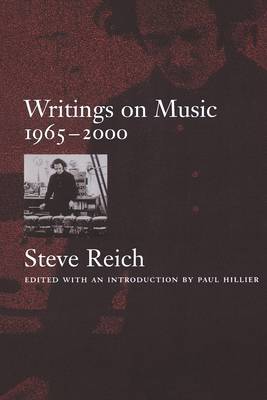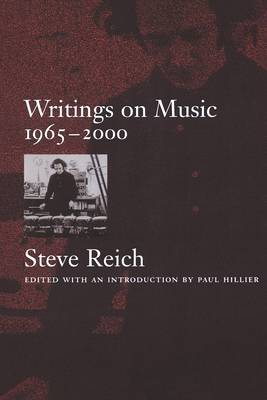
- Retrait gratuit dans votre magasin Club
- 7.000.000 titres dans notre catalogue
- Payer en toute sécurité
- Toujours un magasin près de chez vous
- Retrait gratuit dans votre magasin Club
- 7.000.0000 titres dans notre catalogue
- Payer en toute sécurité
- Toujours un magasin près de chez vous
Description
In the mid-1960s, Steve Reich radically renewed the musical landscape with a back-to-basics sound that came to be called Minimalism. These early works, characterized by a relentless pulse and static harmony, focused single-mindedly on the process of gradual rhythmic change. Throughout his career, Reich has continued to reinvigorate the music world, drawing from a wide array of classical, popular, sacred, and non-western idioms. His works reflect the steady evolution of an original musical mind. Writings on Music documents the creative journey of this thoughtful, groundbreaking composer. These 64 short pieces include Reich's 1968 essay "Music as a Gradual Process," widely considered one of the most influential pieces of music theory in the second half of the 20th century. Subsequent essays, articles, and interviews treat Reich's early work with tape and phase shifting, showing its development into more recent work with speech melody and instrumental music. Other essays recount his exposure to non-western music -- African drumming, Balinese gamelan, Hebrew cantillation -- and the influence of these musics as structures and not as sounds. The writings include Reich's reactions to and appreciations of the works of his contemporaries (John Cage, Luciano Berio, Morton Feldman, Gyorgy Ligeti) and older influences (Kurt Weill, Schoenberg). Each major work of the composer's career is also explored through notes written for performances and recordings. Paul Hillier, himself a respected figure in the early music and new music worlds, has revisited these texts, working with the author to clarify their central narrative: the aesthetic and intellectual development of an influential composer. For long-time listeners and young musicians recently introduced to his work, this book provides an opportunity to get to know Reich's music in greater depth and perspective.
Spécifications
Parties prenantes
- Auteur(s) :
- Editeur:
Contenu
- Nombre de pages :
- 272
- Langue:
- Anglais
Caractéristiques
- EAN:
- 9780195151152
- Date de parution :
- 28-10-04
- Format:
- Livre broché
- Format numérique:
- Trade paperback (VS)
- Dimensions :
- 159 mm x 234 mm
- Poids :
- 430 g

Les avis
Nous publions uniquement les avis qui respectent les conditions requises. Consultez nos conditions pour les avis.






